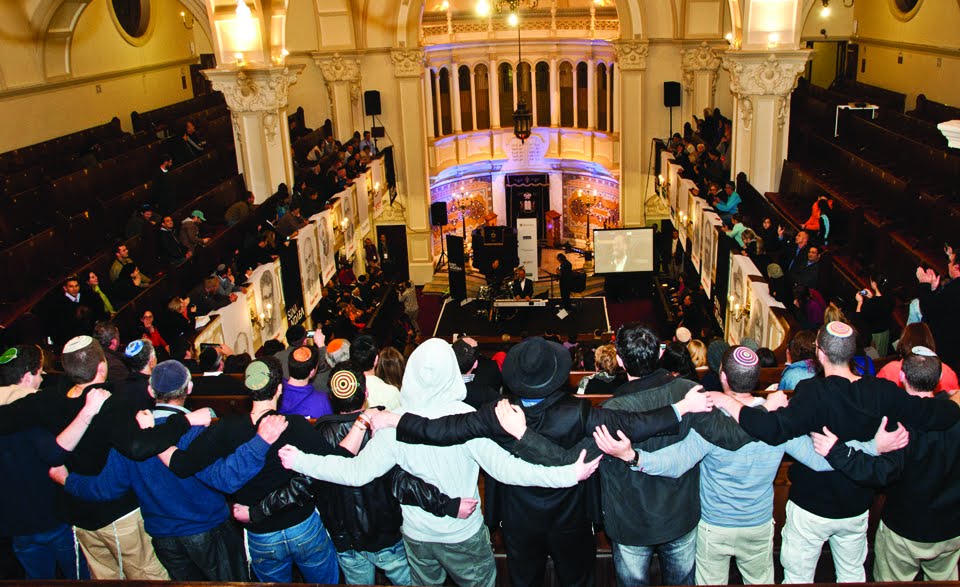 |
Like one man with one heart
Psychologists, filmmakers, professors, historians, geopolitical experts, Rosh Yeshivas, mystics, musicians, survivors; an assortment of great minds and personalities rooted in the values of Torah Judaism.
In June, they ascended on the Mother City for Sinai Indaba II — an event unprecedented in terms of its scope, variety and vision. The speakers drew an equally diverse crowd, with Capetonian Jews of every guise braving the weather to gather at the foot of the mountain for the Sinai experience. The Albow Centre campus was abuzz, and the crowds kept piling in, until an enforced decision was made: We’d need a bigger venue.
The magnificent 1300-seater Gardens Shul was elected the new venue. Rabbi Lawrence Kellerman presented the keynote address, where he provided an intriguing argument for the Divine nature of the (original) Sinai experience. Next up, ‘one man with one heart’ became two men with two hearts; as participants were split along partisan lines — some opting for the relationships insights of Lori Palatnik, others opting for English literature professor William Kolbrenner.
I went for Kolbrenner, and wasn’t disappointed. He delivered an elegant dissertation on the nature of tolerance, looking at secular notions of the ideal and comparing these with the Torah’s description. Kolbrenner exuded a wonderful broad-mindedness, embodying the notion of tolerance itself.
Day two dawned dark and miserable, and for a while, the prospect of thunder and lightning looked as though it would add an unintended realism to the Sinai experience. Despite this, the crowds once again flocked to Hatfield Street, excited for a full line-up of speakers.
The quality continued. Shrek scribe, David Weiss, charted his journey from Hollywood film-writing maverick to Torah-observant Hollywood film-writing maverick; the impish Rabbi David Aaron ad-libbed a series of self-deprecating one-liners, surprising and delighting a packed auditorium; and Rabbi Berel Wein spanned Jewish history in two monumental talks.
Perhaps most affectingly, Rebbetzen Eva Sandler relived the story of how her husband and two sons were gunned down in the Toulouse terror attack; and of how, through tears and trauma, she made the decision to get back out into the world and continue her husband’s outreach work. Other speakers included former IDF military intelligence officer Dr. Mordechai Kedar on geopolitics in the Middle East; Rabbi Manis Friedman grinning through his glorious whiskers about ‘the comedy of marriage’; and psychology professor David Pelkovitz on happiness and parenting.
Star Israeli singer/songwriter Yonatan Razel closed Sinai Indaba II with a rousing musical performance.
Unite, inspire, discover
Sinai Indaba II was an undeniably slick affair — from the marketing campaign to the ushers and the timekeepers; to speakers straining to cram their life’s work into 45 minutes. From start to finish, it felt like a high-level academic conference.
Of course, the credit for this goes to Sinai Indaba originator Chief Rabbi Warren Goldstein. As is typical of the man, he either brushed off or redirected the ‘kudos’, preferring instead to dwell on the Cape Town community and congratulating them for making the event such a success. “Cape Town, you have been awesome,” he exclaimed. “Sinai Indaba II in Cape Town has been tremendous!”
Indeed, proportionally, the turnout in Cape Town exceeded that of the Johannesburg Indaba — a detail that the Chief didn’t neglect to mention. He is, however, quick to emphasise that this was about more than just numbers. “Those who attended the Cape Town Indaba were a living example of what Sinai stands for — ‘Unite, Inspire Discover’. It was amazing to see Capetonians coming together from across the spectrum to be inspired, to discover more about our amazing heritage, and perhaps most importantly, all in a spirit of warmth and unity.”
Reflecting on his experiences in South Africa in Israel’s Jerusalem Report, Rabbi Berel Wein shared similar sentiments: “There is an instinctive unity that exists within the Jewish people but it must be encouraged and nurtured,” he wrote. “This is the importance of groundbreaking events such as the Sinai Indaba. There was an unmistakable undertow of joy and optimism present — a feeling that the Jewish people, its faith, and its homeland state, will not only survive but will continue to prosper; a feeling of joy and of belonging to the ancient eternal people of Israel.”
Overall, more than 1 100 Capetonians attended Sinai Indaba II (double that of last year, and this only after bookings were closed due to lack of space). In general, this year’s event saw record attendance figures across the country, with well-supported Indabas held in Durban and Port Elizabeth, and around 3 200 people attending Sinai II in Johannesburg.











